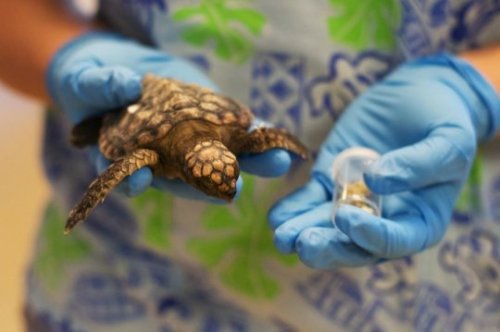#university of georgia
Micronizing ocean plastics threaten sea turtle populations, ocean life cycle
Ingestion of degrading ocean plastics likely poses a substantial risk to the survival of post-hatchling sea turtles because the particles can lead to blockages and nutritional deficiencies, according to new research from Loggerhead Marinelife Center and the University of Georgia. This puts the survival of all sea turtle populations at risk, because sea turtles may take decades to become sexually mature. The study also suggests that micronizing plastics could have tremendous negative implications for the ocean’s food web.
“We may be in the early phases of the first micronized plastic waste-associated species population decline or extinction event,” said co-author Branson W. Ritchie, a veterinarian with more than 30 years of experience in exotic and wildlife medicine and the director of technology development and implementation for the UGA New Materials Institute. “But, an even bigger issue is what micronizing plastics are doing to the ocean’s ecosystem. As ocean plastics continue to micronize, smaller and smaller particles are being consumed by the smallest creatures in our oceans, which compromises the entire food chain, because the plastic in these animals inhibits their ability to uptake the nutrients they need to survive. If the level of mortality we have observed in post-hatchling sea turtles also occurs for zoo plankton, baby fish and crustaceans, then we will witness a complete disruption in our ocean life cycle.”
Post link
Environmental Health Science, University of Georgia


![University of Georgia, 1941 [via]. University of Georgia, 1941 [via].](https://64.media.tumblr.com/tumblr_krd9ciuV031qa64fuo1_500.jpg)
![University of Georgia, 1941 [via]. University of Georgia, 1941 [via].](https://64.media.tumblr.com/tumblr_kqx1zzwUuu1qa64fuo1_500.jpg)